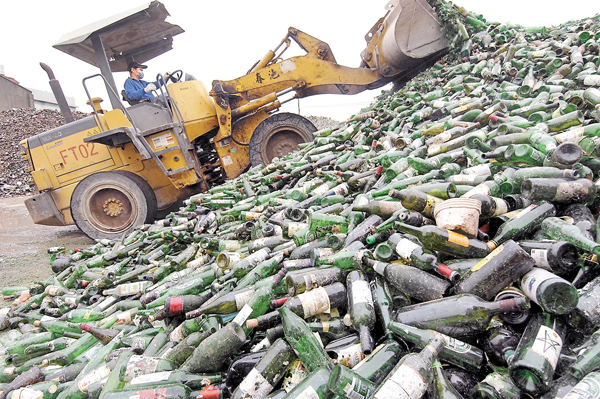 ■ 飲品玻璃樽徵費有望減輕堆填區的負荷。 資料圖片
■ 飲品玻璃樽徵費有望減輕堆填區的負荷。 資料圖片原文:立法會上月三讀通過修訂條例草案(amendment bill),2018年落實飲品玻璃樽徵費(container recycling levy on glass beverage bottles),飲品進口商或供應商使用玻璃樽都要繳付循環再造費。
玻璃樽徵費的最大意義,是透過經濟誘因(economic incentives),鼓勵回收再造,以達至減廢重用的環保目標。當局在考慮徵費的同時,還應對回收玻璃樽後的出路做好配套(infrastructure),避免徵費轉嫁(shift)到消費者身上,實現環保回收機制的可持續發展。
體現「污染者自付」原則
推行玻璃飲料容器徵費,體現「污染者自付」原則("polluter pays" principle)。根據環保署數據,2014年本港每日約有204公噸廢玻璃容器棄置於堆填區(landfill),約佔全港固體廢物總棄置量(daily municipal solid waste disposal)的2.1%。
飲料玻璃樽作為有用的資源,應該循環再造加以善用,而不是棄置到堆填區,增加堆填區負擔(encumbrance),浪費可再生資源。
過去,香港循環再造飲品玻璃樽的出路狹窄,但隨着科研工作不斷進步(technological advancement),飲品玻璃樽經過適當處理,可以用於製造多種不同的建築物料,例如地磚等。
須提升再造後轉售價值
玻璃樽徵費計劃成功與否,關鍵在於玻璃樽的回收率,以及循環再造物料能否廣泛應用(subsequent utilization)。政府除了提供經濟誘因,提升(boost)玻璃樽的回收比率之外,還應加大對循環再造物料的宣傳推廣,擴闊廢瓶循環再造後的使用,尤其提升其轉售價值,避免再生產品無人問津而淪為新垃圾。
引導商家免開支轉嫁消費者
此外,與膠袋徵費(Environmental Levy Scheme on Plastic Shopping Bags)不同,玻璃樽徵費只向供應商(manufacturer)和進口商(importer)收取,市民買玻璃樽飲品時不會被額外收費。
然而,徵費方式始終有累退性(regressive nature),相關開支成本難免會轉嫁到消費者身上。政府應有意識地引導生產商、進口商從降低生產成本等方面着手,自我消化徵收的費用。
目前本港處理垃圾完全依賴堆填區來解決,而3個堆填區最快將於2019年飽和,垃圾處理成為迫在眉睫的棘手課題(pressing issue)。妥善解決垃圾問題,源頭減廢(waste reduction)、擴建堆填區、興建焚化爐(construction of incinerators),缺一不可。
Glass bottles recycling levy to work from 2018
譯文:Lawmakers passed an amendment bill last month to start charging importers and suppliers a container recycling levy on glass beverage bottles from 2018. The levy intends to encourage recycling with economic incentives with the hope to reduce waste and facilitate recycling of waste glass containers.
Apart from imposing the levy, the government should also bear in mind the sustainability of the recycling system and make preparations for supporting infrastructures, so that the fees would not be shifted to consumers in the end.
"Polluter pays" princple at work
The introduction of the levy on glass beverage bottles is indeed an embodiment of the "polluter pays" principle. According to the statistics published by the Environmental Protection Department, the amount of waste glass containers disposed of at landfills averages 204 tonnes, which constitute about 2.1% of Hong Kong's daily municipal solid waste disposal in 2014.
As glass beverage bottles could serve multiple purposes after recycling, these resources should really be sent to recycling centres instead of being another encumbrance to our landfills.
In the past, the commercial value for glass beverage bottles was very limited. But thanks to technological advancements, presently these bottles could be turned into materials for the production of various construction materials such as eco pavers.
Promoting value of recycled materials
Without a doubt, success of the levy would be heavily dependent on the recycling rate of glass beverage bottles and the subsequent utilization of the recycled materials. Apart from providing economic incentives to boost the recycling rate, the government should also increase its efforts in promoting recycled materials. A higher commercial value due to wider utilisation could make sure that the recycled materials would not be dumped in the landfills again.
Don't let consumers bear the cost
Unlike the Environmental Levy Scheme on Plastic Shopping Bags (plastic bag levy), the new glass bottle levy is targeted at manufacturers and importers, not the general public.
Due to the regressive nature of the levy, however, the cost might still eventually be shifted to consumers. To avoid such possibility, the authorities should aid manufacturers and importers to lower their cost of production, so that they could digest the extra cost imposed by the new levy.
Currently, waste management and disposal has become a pressing issue in Hong Kong. Waste disposal depends heavily on landfills, but all three landfills will become full by 2019. Waste reduction, landfill expansion and the construction of incinerators have become integral to tackling the waste issue.
Learning point
與亞洲其他經濟發展相近的城市相比,香港每日產生的廢物量一向偏高,而現有3個堆填區將於3年內飽和,處理垃圾刻不容緩。
可惜本港環保政策一直落後,回收配套亦不足夠。例如現在政府推行的生產者責任計劃,台北和韓國就分別早於1997年和2003年已經實行。
非強制回收 配套要做足
而將於2018年落實的飲品玻璃樽徵費,將只作強制收費,而非強制回收。如果屆時仍然缺乏誘因推動商人協助回收,費用將很可能轉嫁到消費者身上;若回收配套仍未足夠,玻璃樽回收後亦可能會被送到堆填區。
今次投反對票的飲食界議員張宇人就表示,香港應設立玻璃樽稅務優惠,為零售業、飲食業退稅以鼓勵回收。
現時市民仍普遍存疑,擔心廢物分類後會否依舊被送到堆填區,而且時有消息指新界廢物收集場及回收場,會排放不符合標準的污水污染環境。
因此,政府除推動社會回收廢物之外,同時必須積極規管和協助本地回收業,令市民建立起信心,更有效地合作,動手減少廢物。
■Jeffrey Tse [ywc_jeffrey@hotmail.com]
